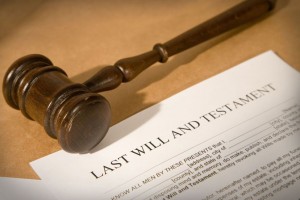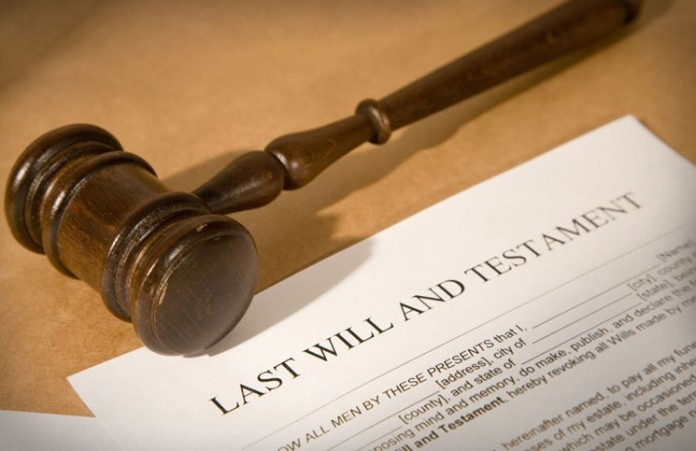Written by Soubhik Chakrabarty, 1st Yr, Rajiv Gandhi National University of Law, Patiala, on the law of intestacy.
We all know how property is inherited when someone takes the trouble to leave a will behind. However, what happens when there is no valid will? How does the property get distributed amongst the nearest kith and kin? This is information that almost everyone needs to understand, basically for two reasons. Firstly, so that you do not neglect the duty of making a will, and secondly, so that you understand your own interests, obviously!
To make things simpler, let us take an example. X died, causing much grief, and left behind his mother, widow, a son and a daughter without a will. He also leaves behind some agricultural land, some money in the bank, a house and some equity shares in a Demat account. How will the property be distributed and what are the steps to take so that the property of the deceased in transferred to the rightful inheritors?
In legal terms, the person who dies without leaving a will is called an ‘intestate’. In legal terms, the son, daughter, wife and mother are all called Class-I heirs and the money would be shared equally among them. Here the son and the daughter are assumed to be adults and not minors. If they are minors, then their amount of the property would be held by their mother until they are 18.

Distribution of property after death of the intestate
Under Indian laws, the distribution of property is different for all religions. For instance, Hindus and Muslims have their own inheritance laws – which were unwritten in the beginning, but most of it has been codified in laws made by government of India – with a notable exception of Muslim laws.
Inherited Property – Distribution procedure for HINDUs
If you are a Hindu, the property consisting of the intestate’s land and house, will be distributed equally among the four Class-I heirs – the daughter, son, wife and mother.
Distribution procedure for Muslims
If you are a Muslim, the Muslim laws of inheritance require at least 2/3 of the deceased’s property to go by line of succession to his family and allow up to 1/3 to be settled by testamentary succession. But as there was no will here, the property bequeathed will go to the man’s heirs in absence of a will by him.
Immediate concerns:
-
- Right after death, get the death certificates from the municipality, which will be shown when inheriting money from bank accounts, closing the deceased bank accounts, etc. Family members are required to register the births and deaths within the prescribed period of 21 (twenty one) days from the date of death to the registrar.
The registrar is:
- Right after death, get the death certificates from the municipality, which will be shown when inheriting money from bank accounts, closing the deceased bank accounts, etc. Family members are required to register the births and deaths within the prescribed period of 21 (twenty one) days from the date of death to the registrar.
In Rural areas,
-
-
- Registrar (rural) – Village accountant
-
In Urban areas the following are the registrars
-
-
- In case of City corporations: Health officer.
- In case of City Municipal councils: Health officer/Health inspector.
- In case of Town municipal councils: Health inspector.
- In case of Notified areas/Project areas/Cantonment – Health inspector.
-
-
- As there is no will, the legal heirs will have to get a succession certificate for inheriting the property. You should file an application in the civil court of the district where the property is of the deceased or where he normally he lived in. A notice will then be given by the court to you – the legal heirs; and an ad will also be published in the newspaper. The court will then take a time of around 4-6 weeks, where the court will wait for objections to the inheritance, if any, from others. After that the court will pass a succession order certificate. The party concerned, i.e. you, will have to give judicial stamp paper of sufficient amount prescribed by the court fee structure to the court. The local law of the State in which the property is situated determines the stamp duty and court fees.

-
- The legal heirs will have to apply to the probate registry to deal with the estate. In this case you need to apply for a ‘grant of letters of administration’. An application needs to be filed in the court for the letter of administration for the property. ‘Letter of administration’ is a certificate granted by the competent court to an administrator. If the grant is given, you will be known as ‘administrators’ of the estate. The grant of administration is a legal document which confirms the administrator’s authority to deal with the deceased person’s assets.
- The legal heirs will have to make an application to the court within 90 days from the death of the deceased inheriting the house and land in the following manner:
- The agricultural land will be divided into four equal parts, each of the four members given an equal share.
- The house is normally inherited in the name of the four heirs as joint owners. If however the daughter wants to sell her portion of the house, the whole house may be sold and the amount of sale may be equally divided but only if the son/s wants the division. (Section 23 of Hindu Succession Act)
- If the deceased person owned property with another person or persons as ‘beneficial joint tenants’, the deceased person’s share automatically passes to the surviving joint owner(s)
Taking the money out from the bank
If the bank account of the deceased has no nominee mentioned then according to Reserve Bank circular dated 12 July 2005, if the money is less than the threshold limit decided by different banks (which is normally around Rs.1 lakh) then banks are advised to desist from insisting on production of succession certificate, letter of administration, etc. Here the legal heirs i.e. all the four successors, have to sign a letter of indemnity which states that the bank is not liable any more. The heirs, i.e. you, will be receiving payments from bank as trustee of legal heir from the deceased person. If any legal problem surfaces regarding the ownership of the bank money, then the complainant will deal directly with you and not with the bank.
If the money in the bank is more than the threshold limit decided by your bank, then succession certificate is mandatory. For inheriting the money of the deceased, all the legal heirs should also write and sign a Joint application for the same.
If the deceased person had held money with another person in a joint bank or building society account, the surviving joint owner automatically owns the money. If there is a nominee, the bank will establish the fact of death of the deceased (death certificate is necessary) and the identity of the nominee, then the remaining balance will be transferred to the nominee. The bank will make clear to the nominee that he/she would be receiving the payment from the bank as a trustee of the legal heir of the legal depositor, i.e. the nominee would have to return the money to the legal heirs of the deceased.
Demat Shares
The legal heirs should make an application to the depository participant of the deceased (DP), to transmit the shares to the legal heirs’ Demat account (i.e. your account). A DP is the person who opens the share account for people and does transactions on behalf of him. He is the intermediate between the depository and the investors (here the investor is the deceased). The DP (of the deceased) will demand a copy of death certificate duly notarised and the succession certificate (which you got from the court) which is also duly notarized by notary people who are advocates who authenticate the certificates with their seal) or an order of the court. A copy of probate or letter of administration is also required. Then you will get the Demat shares distributed equally among the four.
If no Class – I heir is present then the property would have been distributed equally among those present in Class-II heirs.
The Class-II heirs include:
- Father
-
- Son’s daughter’s son,
- Son’s daughter’s daughter,
- Brother,
- Sister
-
- Daughter’s son’s son
- Daughter’s son’s daughter,
- Daughter’s daughter’s son,
- Daughter’s daughter’s daughter
-
- Brother’s son,
- Sister’s son,
- Brother’s daughter,
- Sister’s daughter
-
- Father’s father;
- Father’s mother
-
- Father’s widow;
- Brother’s widow
-
- Father’s brother;
- Father’s sister
-
- Mother’s father ;
- Mother’s mother
-
- Mother’s father;
- Mother’s sister
LawSikho has created a telegram group for exchanging legal knowledge, referrals and various opportunities. You can click on this link and join:
https://t.me/joinchat/J_
 Serato DJ Crack 2025Serato DJ PRO Crack
Serato DJ Crack 2025Serato DJ PRO Crack









 Allow notifications
Allow notifications



im hindu vishwakarma brahmin.we have property in our name my mother .she was died year ago .we 12 childrens i wants to build a building.one of my brother he dont wants to signature .indirectly im the owner of the property cos im living in abroad .what is the solution
What happens if the legal heirs of a property are not able / or for some reason do not initiate the inheritance of a large immovable property fr a period of tym …say one year
I do not agree that a succession certificate is required for inheriting an immovable property. The Indian Succession Act mentions the requirement of this certificate only for debts and securities. I believe that a legal heir certificate is needed for inheriting immovable property. Please enlighten me if my understanding is incorrect.
Very nice article and great information presented regarding distribution of property.